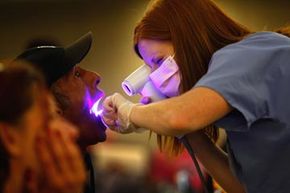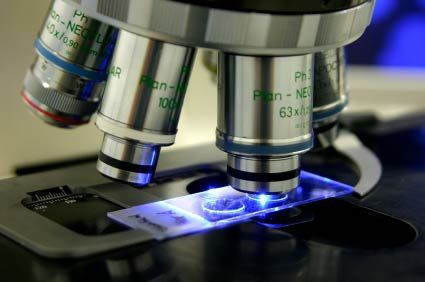For anyone who is a baseball fan, the images of major leaguers with cheeks swollen from a mouthful of chewing tobacco are indelible. So was that of Gruen Von Behrens, who was 32 years old when he testified before a congressional subcommittee in 2010. Behrens, who started using smokeless tobacco at age 13 to emulate his baseball heroes, had already endured 34 surgeries to treat his mouth cancer -- surgeries that claimed part of his tongue, his lower jaw and half of his neck muscles. His face literally looked like it had been caved in.
Like many forms of this dreaded disease, oral cancer -- commonly referred to as mouth cancer -- can have a devastating impact on its victims. Survivors often bear the scars of repeated surgeries, radiation treatment and chemotherapy, and those scars can be much more debilitating because they're often highly visible. Yet the survivors can count themselves fortunate, because oral cancer can be fatal.
Advertisement
Oral cancer is also prevalent. According to American Cancer Society statistics, more than 36,000 people were diagnosed with the disease in 2010, and almost 8,000 deaths were directly attributed to mouth cancer. The Oral Cancer Foundation (OCF) estimates that more than $3 billion is spent annually in the United States to treat head and neck cancers.
The renegade cells that form malignant tumors can attack healthy tissues in the oral cavity, which includes the lips, the lining inside the lips and cheeks (also known as the buccal mucosa), the bottom or floor of the mouth underneath the tongue, the front two-thirds of the tongue, the top of the mouth (or hard palate), the soft back of the mouth (uvula), teeth, gums and salivary glands.
The mouth is an area that's particularly susceptible to infection, since it's an open gateway to the rest of the body. In fact, roughly 90 percent of oral cancers develop in the lining of the mouth (called the squamous cells), which comes into contact with almost everything we ingest or inhale [source: Granick]. With the oral cavity's proximity to the lymph nodes in the neck, and the ability of the lymphatic system to spread cancer, undiagnosed oral cancer can quickly become deadly.
For that reason, there are several risk factors to be aware of. Tobacco, which is a well-known carcinogen, can damage these cells in all forms, whether in a gaseous form (such as cigarette, cigar, and pipe smoke) or solid varieties, such as snuff or chewing tobacco. According to the American Cancer Society, more than 90 percent of all oral cancer cases can be attributed to some form of tobacco use.
Frequent alcohol consumption is another red flag. And when alcohol and tobacco use are combined, the risk of contracting oral cancer is believed to be more than 100 times greater than those who don't use either [source: Granick].
Men are twice as likely to develop mouth cancer compared to women, probably because they're more likely to consume tobacco and alcohol in greater doses and over longer periods of time. Age is also a factor, especially after 35. American Cancer Society statistics reveal that half of all oral cancer cases are found in patients 62 and older.
Additional risk factors include prolonged exposure to the sun, an inadequate diet without proper levels of fruits and vegetables and HPV (human papilloma virus) infection -- which has been linked to oral sex and multiple partners. Also talk to your physician about any family history of cancer.
What are some early signs of mouth cancer?
Advertisement

